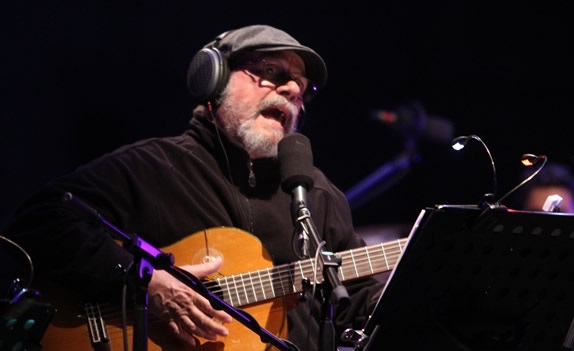In “Silvio Rodríguez y la trova cubana: la utopía de un mejor mundo,” Monse Aguilar (PijamaSurf) writes about this artist’s creative trajectory and the love and respect he has earned through the decades. [Many thanks to Peter Jordens for bringing this item to our attention. Visit PijamaSurf to read original article and to listen to a selection of music videos of Rodríguez’s most well-known songs.].
Throughout his career, Silvio Rodríguez has been characterized as a humble artist. At his concerts you can always see a man with glasses, casual mode of dress, soft voice, and acoustic guitar. Love and appreciation by the public have been kept alive throughout Latin America.
Much of this is because Silvio Rodríguez was a pioneer of Cuban Nueva Trova. This socially conscious, literary, folk songwriting movement spread from the Caribbean to South America in the 1960s. Such was the popularity of his music among leftists that in some countries, like Argentina and Chile, his music was banned by various military dictatorships, so for many years his songs circulated clandestinely on cassettes.
Although it is difficult to choose a favorite song, without a doubt the most popular song in his repertoire is “Ojalá.” The lyrics of this tune summarize the questioning attitude that Silvio has had towards life. Ever since he began composing on his guitar while serving in the military in the 1960s, his songs have captured the doubts, dreams, and beliefs of people’s inner lives.
He has sung about dreams, uncertainties, disappointments, death, love and hope, emotions that come together in an ambiguous sense of longing and justice. For many critics, his music is almost transparent, thanks to his arrangements for guitars (including the Cuban tres), electric bass, flute or clarinet, and a light-touch drummer.
An example of this “lean” musical style is heard in the song “Sinuhé,” a plaintive waltz that imagines legendary figures such as Sinbad, Ali Baba, or Aladdin wandering through Baghdad. He composed the lyrics after the US bombing: “1001 noches de fuego y codicia/1001 noches sin Dios ni perdón” [1001 nights of fire and greed / 1001 nights without God or forgiveness.]
But more often the songs turn to the mythical and metaphorical; for example, a lover’s kiss that dawn brings, as in “La gota de rocío” [The Dew Drop]. Being swallowed by a snake that destroys itself from within, as in “Sueño con serpientes” [I Dream of Serpents]. Or going on a quest to find a lost blue unicorn, as in “Unicornio” [Unicorn]. His songs are full of seekers trying to find inspiration, answers, love, and causes worth fighting for.
Generations of Latin Americans know “Unicornio” by heart, with its call for anyone who can recognize a lost blue unicorn to get in touch. Widely adopted as a metaphor for the search for utopia, it became the soundtrack for guerrilla struggle in Nicaragua and El Salvador, and a challenge to military dictatorships in Argentina and Chile.
Silvio Rodríguez has become one of the most influential political singers alive. The Cuban singer changed the face of the songs of the 20th century in Latin America and Spain. And he has achieved that because his songs are not only full of metaphors and allusions to very specific moments in history; his music has transcended the years and is still valid for each generation that resignifies his lyrics and reappropriates them to keep resistance alive.
Long live the hope, the yearning, and the utopia of a more just Latin America.
Translated by Ivette Romero. For original article (in Spanish) see https://pijamasurf.com/2022/06/silvio_rodriguez_el_significado_no_literal_de_sus_mejores_canciones/
[Above: Photo of Silvio Rodríguez at the Zócalo, Melva Navarro / Creative Commons.]


3 thoughts on “Silvio Rodríguez and Cuban nueva trova: a utopia for a better world”